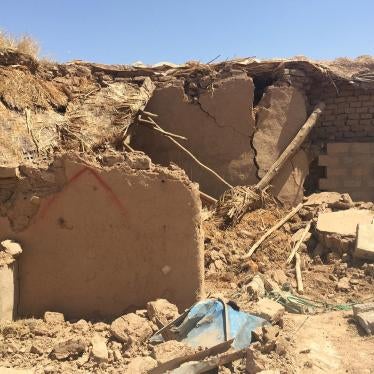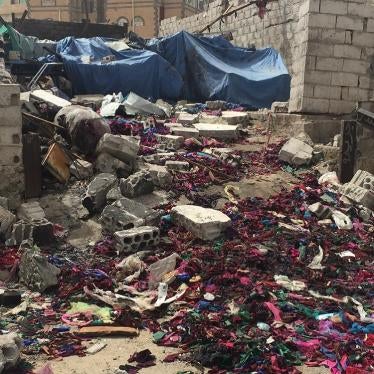(Brussels) – The European Union (EU) should freeze the assets of the Syrian National Oil Company, Syrian National Gas Company, and the Central Bank of Syria until the Syrian government ends gross human rights abuses against its citizens, Human Rights Watch said today. On August 13, 2011, Human Rights Watch sent a letter to the EU High Representative and foreign ministers of the 27 member states urging them to swiftly impose such sanctions.
Since August 1 Syrian security forces have killed at least 231 antigovernment protesters and other civilians in attacks on Latakia, Deir al-Zor, Homs, and small towns across Syria, according to local human rights activists. Over the last four days, security forces have attacked and carried out large-scale arrests in the Latakia neighborhoods of Slaybeh, Skantouri, Raml al-`Ali, and Sheikh Daher. Security services have also detained prominent political and human rights activists such as Abdel Karim Rihawi.
“Syria’s authorities are still killing their own people despite multiple efforts by other countries, including former allies, to make them stop,” said Lotte Leicht, EU director at Human Rights Watch. “It’s time to show the government that Europeans won’t help to fund its repression.”
Under Syrian law the government is the major shareholder in the oil and gas sector through its ownership of the Syrian National Gas and Syrian National Oil companies. These two companies have a 50 percent share in every oil and gas project in Syria. In a March 2010 report, the International Monetary Fund estimated that the Syrian government earns approximately €2.1 billion from oil and gas revenues per year. Most of Syria’s oil and gas is used domestically, but it exports about 150,000 barrels per day, and around 95 percent of that goes to Europe, primarily to Italy, the Netherlands, France, and Germany.
The EU has already frozen the assets of 35 Syrian officials and four entities in response to Syria’s widespread human rights abuses. The EU imposed similar assets freezes against the Libyan oil sector and central bank in March.
In its letter Human Rights Watch urged the EU to conduct regular reviews of the impact of sanctions to assess any potential humanitarian impact, and to tie the lifting of the sanctions to measures that demonstrate a change of policy by the government, such as an end to the use of excessive and lethal force against peaceful demonstrators, releasing all detainees held merely for participating in peaceful protests or for criticizing the Syrian authorities, and full cooperation with the fact-finding mission mandated by the United Nations Human Rights Council or other international mechanisms tasked with investigating alleged human rights violations.
“The aim is to harm the government’s ability to fund its repression and not to hurt the Syrian people who are courageously demanding their basic rights,” Leicht said.
Since the beginning of antigovernment protests in mid-March Human Rights Watch has documented a systematic pattern of widespread and serious human rights violationscommitted by Syria‘s authorities. According to local human rights groups, security forces have so far shot and killed around 2,000 civilians, and have detained more than 10,000 activists, protesters, and even bystanders, regularly subjecting them to torture and ill-treatment.
Despite presidential amnesties and promises of reform, thousands of activists and protesters remain in detention with no confirmation of their whereabouts or the legal grounds for their detention. Evidence of systematic killings, enforced disappearances, and torture by Syrian security forces in some of Syria’s cities, such as that committed in Daraa, strongly suggest that these acts rise to the level of crimes against humanity.
Syria’s authorities have sought to hide their violations by preventing access to protest areas for journalists and independent observers, including the Human Rights Council’s fact-finding team, and by limiting and sometimes shutting down internet and telephone communications inside the country.
“Maybe the Syrian regime will treat its people better when it realizes that it risks being unable to pay its security forces,” Leicht said. “EU member states should send a clear and united message to the Assad government that continuing these abuses will bring consequences.”






